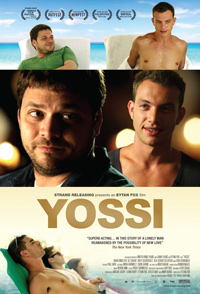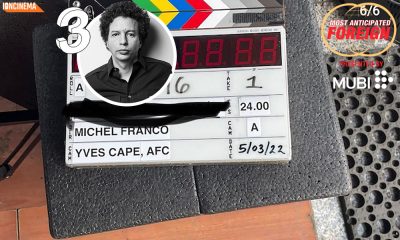Reviews
Yossi | Review
Closet Space: Fox Brings a Welcome Addendum to Celebrated Film
 Eytan Fox’s much celebrated 2002 film, Yossi & Jaggar, concerning a passionate and secret love affair between two male Israeli soldiers, one of which dies tragically in combat in the arms of the other on the border of Lebanon, clapped a melancholy ending on what seemed a romance impossible to openly disclose both in time and place. A decade later, after debuting several other successful films, Fox returns with Yossi, who has also aged ten years and still remains in the closet. Not only does this followup serve as a continuation of a character from a film that’s gone on to develop a cult status in the queer film canon, but also as survey of progress in the acceptance of queer representation.
Eytan Fox’s much celebrated 2002 film, Yossi & Jaggar, concerning a passionate and secret love affair between two male Israeli soldiers, one of which dies tragically in combat in the arms of the other on the border of Lebanon, clapped a melancholy ending on what seemed a romance impossible to openly disclose both in time and place. A decade later, after debuting several other successful films, Fox returns with Yossi, who has also aged ten years and still remains in the closet. Not only does this followup serve as a continuation of a character from a film that’s gone on to develop a cult status in the queer film canon, but also as survey of progress in the acceptance of queer representation.
Still mourning the death of his lover, Jaggar, Yossi (Ohad Knoller) now works as a physician in an Israeli hospital, still repressed and closeted, fending off the increasingly aggressive advances of a female colleague, as well as hiding his orientation from another heterosexual doctor he has befriended. While his recently divorced colleague tries to get Yosssi out on the straight bar scene for drink, drugs, and easy females, Yossi anonymously trolls online sex sites for sexual fulfillment.
Wearing his unhappiness plainly on his weary and bloated visage, Yossi burns the candle on both ends, which has severely altered his physical appearance, making the likelihood of his finding acceptance or partners in the usually superficially charged gay community quite slim. Suddenly, a mysterious patient shows up for a check-up at the hospital, and Yossi recognizes Varda Amichai (Orly Silversatz Banai) as the mother of the dead Jaggar. Insisting on treating her, Yossi ends up driving her home as she opens up to him with casual details about her personal life. Yossi has never publicly acknowledged his love for Jaggar and is unable to tell Varda during this first encounter, but he shows up in plainclothes several scenes later resolving to do so. As if this spoken acknowledgement finally unplugs something, Yossi takes a sudden road trip vacation, and on the way stumbles into four young Israeli officers in need of a ride. One of the young men, Tom (Oz Zehavi) is openly gay, and Yossi is obviously intrigued and attracted to him. Deciding to stay at the same hotel he drops them off at, Yossi engages in a series of interactions with Tom, and discovers that there may be the possibility for love again.
While Eytan Fox’s Yossi & Jaggar was a daring and devastating film, this decade later followup is much more quiet and introspective. The singular Yossi has been left without a support group of any kind, the effects of which can be read as manifesting physically, his portly frame a testament to the only pleasure he may find solace in. Just as it seems like it may be too late for him to find a healthy outlet in the gay community, Yossi finds his breath of fresh air with Tom, who is openly gay and serving in the army, a statement that would have been unheard of a decade previous. Yossi, unable to be open, operates by sending passive cues of his orientation, such as the music he plays for the quartet of young men in his car.
More telling is Fox’s reference to Thomas Mann’s Death In Venice, which Yossi is reading at the resort (his musical selection is also a reference point, used in Visconti’s film adaptation of Mann). Venice tells the tale of an older gay gentlemen who is so enamored with a beautiful underage boy staying at the same hotel that he stays to be near him even after a dangerous epidemic sweeps over the country. Fox seems to be taking a historically predatory situation from classical literature and inverting it here. Yossi finally finds a way to open up and live, unlike Mann’s protagonist who is stuck in a place of decomposition and death. While there seems to be a significant generational gap between Yossi and Tom, perhaps referenced a bit too repetitively through their differing tastes in music, there’s a hopeful glow at the end of this chapter in Yossi’s story, with two lovers deciding to stay on in a place likened to Paradise. Quiet and unassuming, Eytan Fox gives us a rather simple narrative about the ever changing difficulties of being gay, and while Yossi perhaps holds more power for those familiar with the preceding tale, it’s nonetheless another welcome film from a masterful director.


































